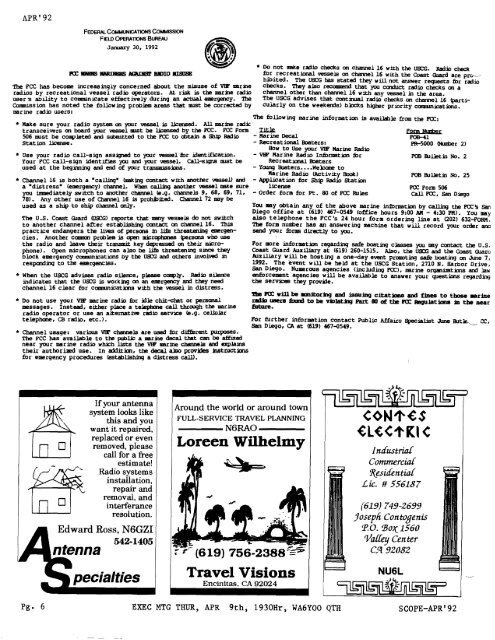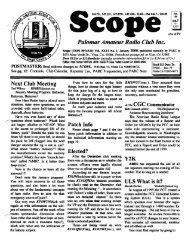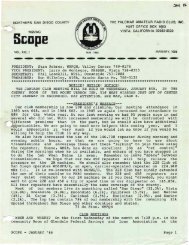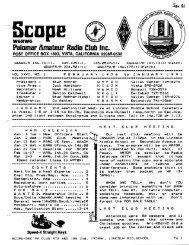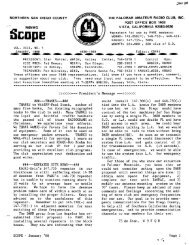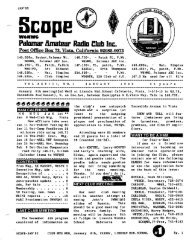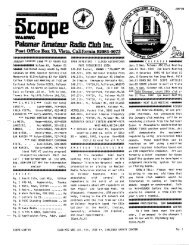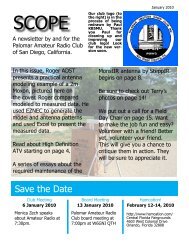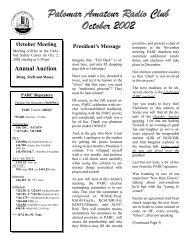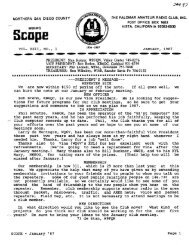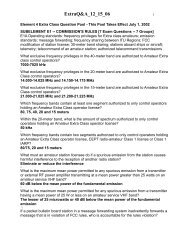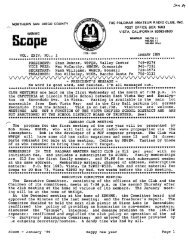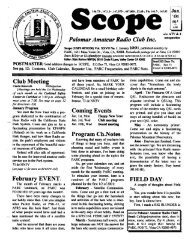1992 - Palomar Amateur Radio Club
1992 - Palomar Amateur Radio Club
1992 - Palomar Amateur Radio Club
You also want an ePaper? Increase the reach of your titles
YUMPU automatically turns print PDFs into web optimized ePapers that Google loves.
APR'92 <br />
FEDERAl COMMUNICATIONS CoMMISSION<br />
FEll OPeAATONS BUREAu <br />
January 30, <strong>1992</strong> <br />
The FCC has become increasinqly concerned about the misuse of VIIi' lIBrine<br />
radios by recreational vessel radlo operators. At risk is the uar:ine rad:io<br />
user'S ability to co_nicate effectively durinq an actual emergency. The<br />
ComaUssion bas noted the followinq problem areas that \IlISt be corrected by<br />
lIIIIrine radio users:<br />
* Make sure your radio system on your vessel is licensed. All uarine radjj:<br />
transceivers on board your vessel IIIISt be licenSed by the rc:c. Fa: FO[1ll<br />
S06 mst be completed am submit.ted to the Fa: to obta.in a SIJjp <strong>Radio</strong><br />
Station lXense.<br />
* Use your radio call-sign ass.iijned to your vessel IDr .identi£ic:ation.<br />
Your FCC call-sign identifies you am your vessel. call-silgns IIIISt he<br />
used at the beqinn.inq am end of your tran&llllsslons.<br />
* Channel 16 is both a "callinq" (mak.inq contact with another vessel) am<br />
a "distress· (emerqency) channel. When call.inq another vessel make sure<br />
you immediately switch to another channel Ie.q. channels 9, 68, 69, 71,<br />
781. Any other use of Channel 16 is prohi:lited. Channel 72 may be <br />
used as a sh.ip to sh.ip channel only. <br />
The U.S. Coast Guard OJS:G1 reports that lIBIly vessels do not switch <br />
to another channel after establishing contact on channel 16. This <br />
practice endanqers the lives of persons .in l.ifi! threaten:ing emergen<br />
cies. Another COlllllXl prtlblem is open mlcrq:>hcne.s ~rsons who use <br />
the radio and leave their transmit key depressed on their lllicro<br />
phonel. Open microphones can also be life threaten.inq since they <br />
block emergency camun:ications by the Us::G and others .involved in <br />
respcn:l.inq to the emergencies. <br />
*' When the USCG advises radjo silen=e, please COIIllly. <strong>Radio</strong> silen=e<br />
indiCates that the USCG is working on an emerqerlcy and they need<br />
channel 16 clear for COllllUl'l:icat.ions with the vessel in distress.<br />
* Do not use your VIIi' uarine radio mr :idle chit-chllt or personal<br />
messages. Instead, either place a teJepbClne call through the uar.ine<br />
radio operator or use an alternative radjo service Ie.g. cellular<br />
telephone, CD radio, etc.).<br />
* Channel usage; various VIP channels are used for diftlerent purposes.<br />
The FCC has available to the public a lIIIIr:ine decal that can be affixed<br />
near your marine radlo wlrich lists the VIP uar.ine cbIInnels am ezpla.inS<br />
their authori2led use. In additXln, the decal also provides tlstlUCtioos<br />
for emergency procedures (establishing a distress caJll.<br />
* Do not llllite radjo checks on Channel 16 with the Us::G. Radlo check<br />
fl:?r. recreational vessels on channel 16 with the Coast QJard are prer-<br />
hiblted. The Us::G has stated they will not answer reqJests mr radjo<br />
checks. They also recoomend that you ca1duct radio checks on a<br />
channel other than channel 16 with any vessel in the area.<br />
T~ USCG advises that contmual radio checks on channel 16 lparticUJarly<br />
on the weekends) blocks ltigher priority conm.m:icatioos.<br />
The followinq marine information is availai:lle from the Fa::<br />
.<br />
IJ.t.k<br />
Form Nlmt:!!:C<br />
- Manne Decal FOB-41<br />
- Recreational Boaters: PR-SOOO CIUd:ler 2)<br />
Bow to Use your VIIi' Marine RaJlo<br />
- VHF Marine <strong>Radio</strong> In1i:>r:natlon mr FOB 8.lJ.letin No. 2<br />
Recreat~ Boaters<br />
- Young Boaters••••Welcame to<br />
Marine <strong>Radio</strong>


